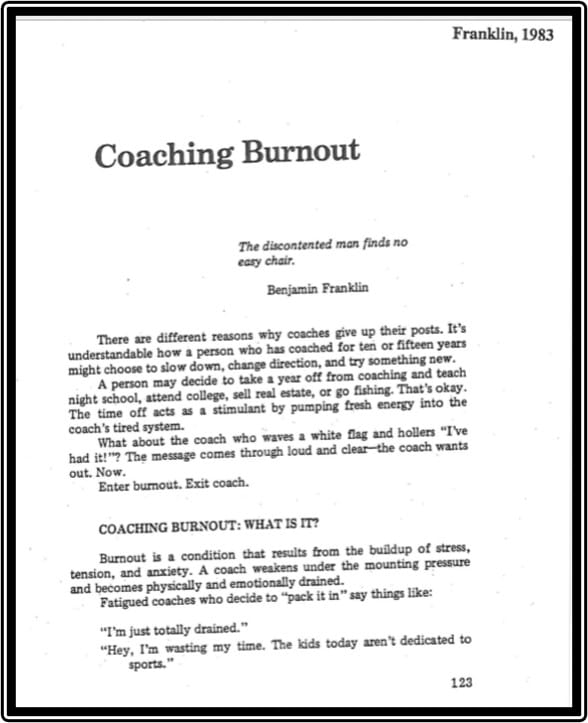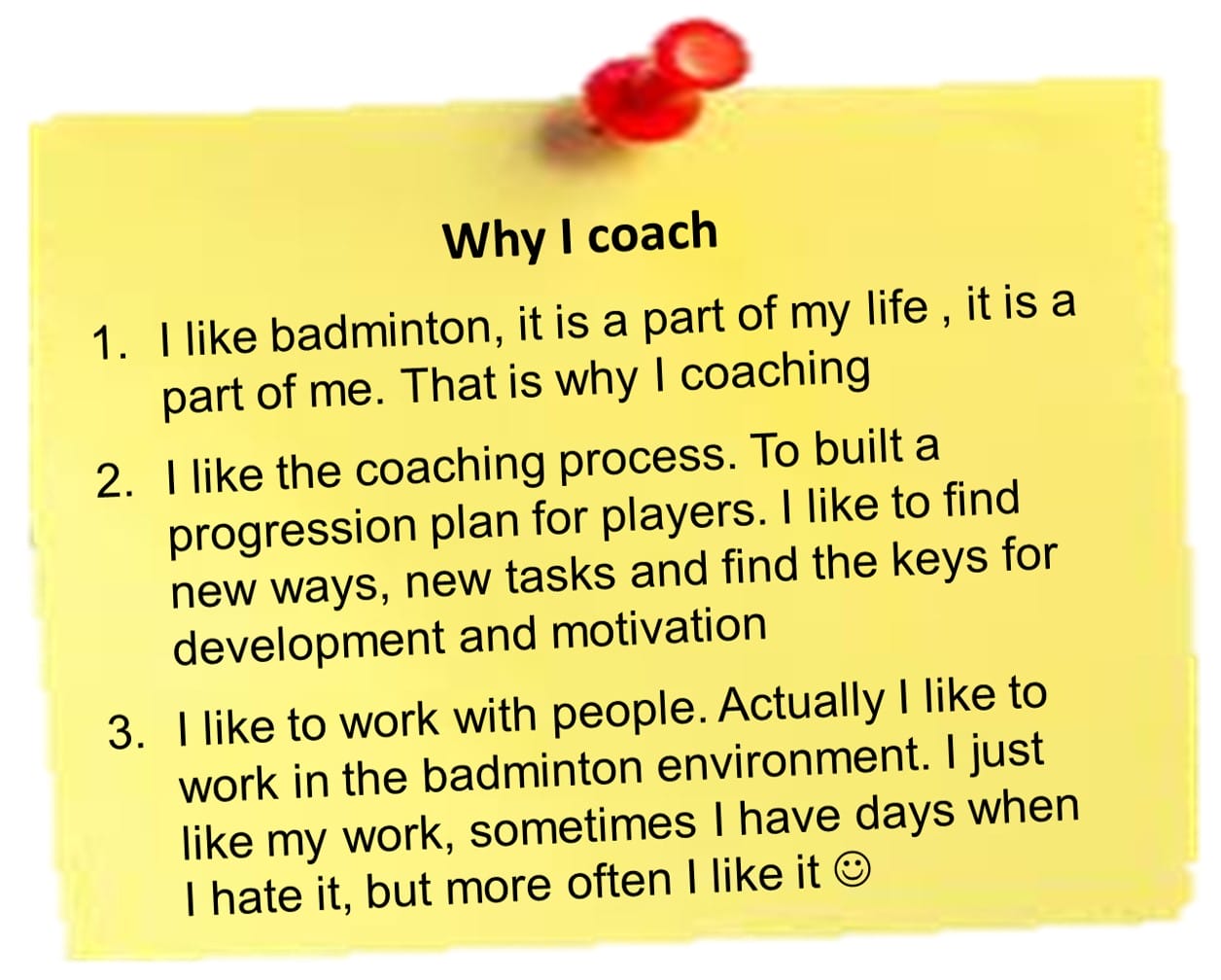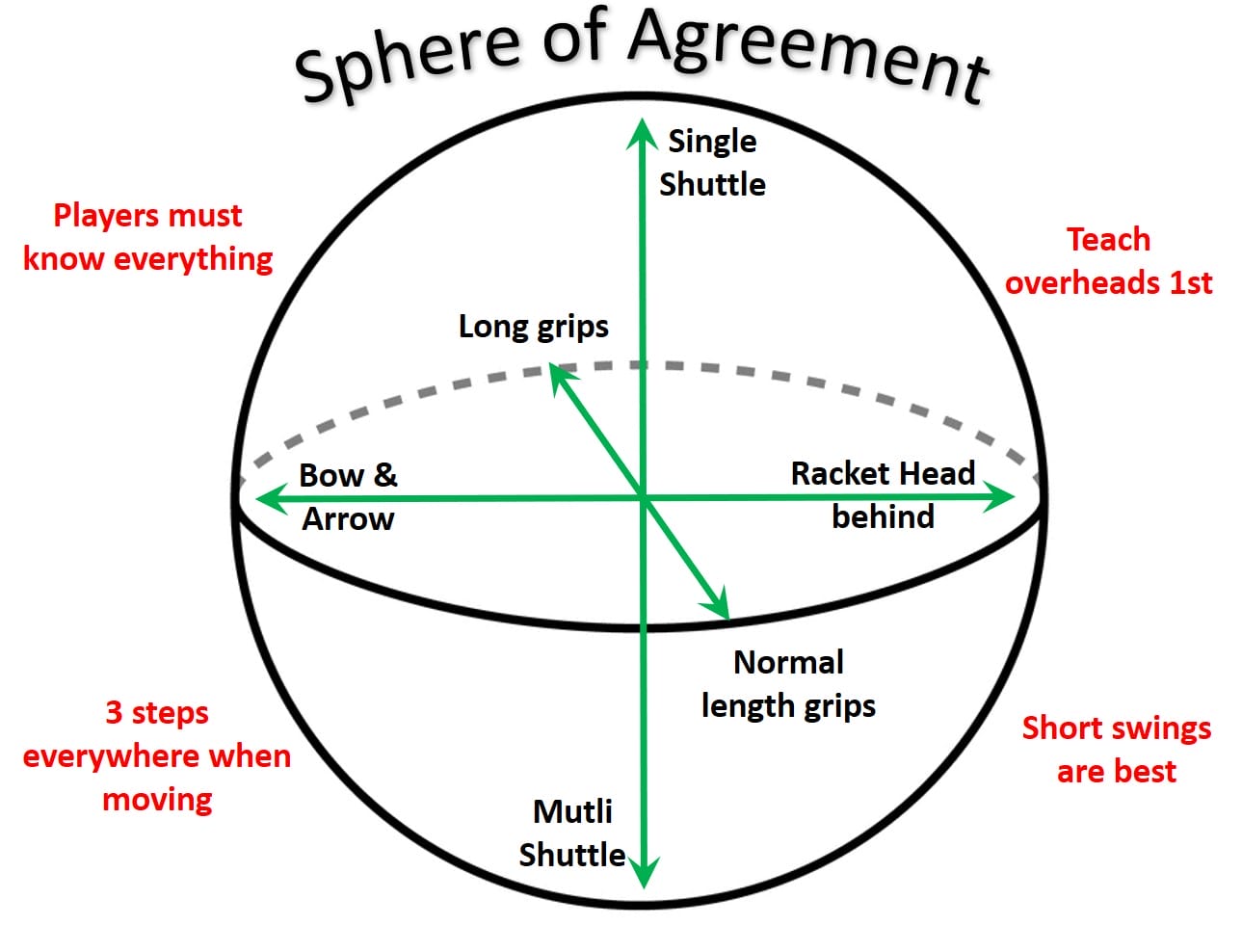How to recognise coach burnout and what to do
Have you ever fallen out of love with Badminton and had burnout?
It’s happened to me at least 4 or 5 times over the last 30 years
The first few times I didn’t know what the feelings were or what to do 🙁
Have you ever felt like I have?
- That feeling of disillusionment with the sport you thought you loved
- Feeling let down by the system, your players, other coaches
- Recognising that the Coach Education system can only take you so far
- Left wondering how to solve your coaching problems but with no one to ask
- Having no enthusiasm to get onto court 🙁
I think that I’ve been extremely lucky to both recognise the signs, the feelings, and then to find solutions and people to help me
We need to discuss the reasons why coaches feel like this and why some badminton coaches choose to give up or feel they have done enough and need a rest
It’s understandable if someone has coached for ten or fifteen years and might choose to slow down, change direction or try something new. But sometimes a coach just feels they “have had enough!’”
… enter burnout
… exit effective coach
“I’m totally drained”
“I’m wasting my time. The kids today aren’t dedicated to the sport”
“Nobody cares. Whenever I ask for something, I get no response”
Nearly every coach at one time or another experiences early signs of burnout
Recognising them can help prevent burnout
– – – – – – – – – – – – – – – – – –
What are they and what can you do to help yourself?
1. Disenchantment & Disillusionment
2. Fatigue
3. Apathy/Motivation
4. Anxiety
5. Supersaturation
6. Conflict
– – – – – – – – – – – – – – – –
1. Disenchantment and Disillusionment
In other words, the thrill is gone
A coach loses the urge to get onto the court, they struggle with motivation, but often don’t know why. They just know that the feeling that they had previously has gone.
Disenchantment happens when you start to not believe in something that previously gave you energy, enjoyment or support.
 Be aware of these, have you ever believed that :
Be aware of these, have you ever believed that :
- your players do not value your input, even though you believe that you give 100%, you seem certain that they offer very little in return
- you are undersupported by fellow coaches even after you reach out for help
- your role is to produce “winners” but you can’t find that magic ingredient and your dream is disappearing
- if your players are winning, your contribution is not being valued when you believed that you made a difference
- as your players get older they listen less, the feeling of “why should I bother” and “they can do what they like” starts to pervade
What can you do?
 Write a list of the reasons why you enjoyed coaching and see if any still apply. You may be surprised at how many do
Write a list of the reasons why you enjoyed coaching and see if any still apply. You may be surprised at how many do- Set yourself a mini-coaching challenge to be completed over the next week. Has it been a while since you challenged yourself?
- Talk with another coach and ask them to tell you what currently inspires them
- List some recent mistakes, recognise them, put a plan together to change and learn from them
- Find another coach and try some joint coaching. Watch, listen and study what they do. I promise it will inspire you.
– – – – – – – – – – – – – – – –
2. Fatigue
Great coaching can demand a large amount of your time, energy and patience.
Be careful, your dedication can sap and reduce your energy without you knowing. You can be tested both physically and mentally. You may think that you have high levels of endurance but I promise over time you will be tested by your own dedication!
It can be super tough for you mentally with all your endless work, if you are always thinking about Badminton. Even tougher if you feel that you aren’t getting the thanks or appreciation from those you coach.
How do you monitor your fatigue levels?
Find a method now and be worried if you can’t get to the end of this article 🙂
What can you do?
 Allocate time each day, each week when you do something physical. Don’t play badminton, do something that uses other muscles and movements. Running, Yoga, walking outside, gym work etc. Do something you enjoy and to a level that you enjoy, remember it’s NOT training.
Allocate time each day, each week when you do something physical. Don’t play badminton, do something that uses other muscles and movements. Running, Yoga, walking outside, gym work etc. Do something you enjoy and to a level that you enjoy, remember it’s NOT training.- Work to a timetable. This means stopping ‘work’ at a certain time. It’s very important to give your mind a rest and to fill it with other things. This could still be sport related if you want, but I’d prefer that you read books, listen to podcasts, watch films. But don’t spend all night talking on Whatsapp with players and coaches.
- How about trying meditation? 🙂 You don’t have to sit with your eyes closed, although that could help. Find something that takes your mind to another place for 5 -10 mins. Research how to create a ‘quiet’ and ’empty’ mind. What methods do you use?
– – – – – – – – – – – – – – – –
3. Apathy and reduced Motivation
Be careful of your ‘inner voice’
Have you had a moment when you start talking with yourself and it’s not all positive?
You may start to find that you are becoming more and more disillusioned and believe that “you don’t care as much as you did”. The thoughts of “doing something completely different” start to get louder.
It can be a tough phase to manage, you feel ok physically but it’s very difficult to create motivation
Be careful of phrases such as
- Why bother, no one appreciates me. I can’t remember the last time someone thanked me
- It’s time to do something completely different, then I’d feel better
- I give 100%, they give me 50%, why should I bother putting in so much effort
- I’m having the same problem over and over, when will things change. I’m doing my best!
- Nothing I do brings me enjoyment – why? 🙁
What can you do?
 Contact a coaching friend who you haven’t spoken to recently and ask what is exciting them in their work. You’ll find that during the conversation it sparks your thoughts and hopefully you also start to get excited.
Contact a coaching friend who you haven’t spoken to recently and ask what is exciting them in their work. You’ll find that during the conversation it sparks your thoughts and hopefully you also start to get excited.- Listen to a podcast, my favourite way to get new ideas outside of Badminton. The Sport Psych Show is a great listen. Also, check out these click here
- Read a book or scan it as I do 🙂 I’m not the best student in the world so find it difficult to read from front to back. However, I can recommend these books (click here). I’m always surprised by how many notes I write that help me later.
- Watching Badminton videos, this can be both good 🙂 and bad 🙁 It depends upon what mood I’m in and what information they are giving me. I really like Badminton Family as it makes sense (most of the time), I recommend you take a look. There are many others that I wouldn’t watch!
How to think of new ideas and inspire yourself with option
Kirk Vallis, Head of Creative Capability at Google shares with us his principles for creative problem-solving
In this discussion, Kirk shares five scenarios that people who support coaches might encounter and explores a range of ways for creating “one more option”.
Kirk challenges you and asks these questions that might help you frame your thinking:
- Where are you when you do your best thinking?
- Do you create space in your organisation for people to be themselves?
- How can you design moments into your practice or workshop, rather than just designing content?
- How do you embrace failure and mistakes in your organisation?
- How do you challenge your thinking for new ideas?
- What mode of thinking do you find yourself in when someone comes to you with an idea??
– – – – – – – – – – – – – – – –
4. Anxiety
Have you ever felt a pressure building up inside you when you are due to Coach or when you are on the court?
You started to feel differently about walking out the door, you get a strange feeling when driving to the hall. The buzz has been replaced with concern, but you don’t know why.
It’s a disturbing feeling caused by anxiety that could be triggered by a number of things
Be aware of setting unrealistic targets and desires.
Not everything and everyone can be perfect (including you) 🙂
Do you recognise these feelings when you …
- find yourself pushing players harder (too hard) as you don’t believe they are improving fast enough … you want them to improve but are unsure if you are pushing too hard or not hard enough
- worry that you may explode (temper) if the players keep talking and taking “unnecessary breaks” during the session… you want them to take breaks but you keep stopping them
- realise that you are starting to irritate players, parents, other coaches with your “professional” attitude … you are unsure if you have the correct mix of professionalism and friendship
- want questions from your players but realise that they are scared to ask in case you get annoyed … you feel that they have great questions but are scared to ask
Then there are times when others notice how the little things irritate you. Things that previously went unnoticed eg players talking, players constantly wanting a new shuttle in practice, players stopping for drinks, asking questions, not listening.
As these build, the coach either explodes without warning or starts to shy away and not communicate.
What can you do?
- Be aware that the voice in your head needs to be shared with other people. Talk with a close friend, a sports psychologist and explain that you don’t like the thoughts you are having.
- If you explode with temper during a session then remove yourself immediately and take a moment to identify the trigger. Not just what caused your immediate loss of control but look for more. How did you feel at the start of the session, how did you feel the last time the trigger happened.
- Realise that your anxiety may not be caused by Badminton. What else is happening in your life. Work to separate your different emotions and try to use Badminton as your ‘Happy Place’ even if only for a few hours.
- Create a written list of the things that irritate you when coaching. Are they really worth getting upset about?
– – – – – – – – – – – – – – – –
5. Supersaturation
This is another hidden stress that can easily overload or burn you out
Be careful of accepting every offer and question. The more you agree to, the more stresses you will face.
If you always try to do your best and add value then the problems can occur. The temptation is to make everything as good as it could be. To try and help everyone you meet. To carry out detailed extensive planning. Spending hours on things that are sometimes valuable but combined together take time away from you.
Saying “Yes” to everyone and everything can be rewarding and dangerous
These are the danger signs of Supersaturation
- The quality of your sessions will reduce as you try to do too much. You think that you’re giving your best. However, Parents, Players, other Coaches will all see what’s happening but may not say anything directly to you, but they will talk amongst themselves.
- You start to finish sessions early so that you can make notes and get ready for the next pupil, or to eat.
- You’ve had no time to plan so rely on “games” sessions to fill the time
- You conduct physical sessions that aren’t planned out and just push players hard hoping that “sweat” will be a good indicator!
 What can you do?
What can you do?
- Learn to say No. Even to friends. Ok, not “no” to everyone, change the reply to “send me an email and I’ll ….”, “I would love to help but I can’t make time until….”, “I can talk with you for 15 mins but that is all, do you still want to chat?”
- Develop relationships where others ask to help. In fact, they demand tasks during practices that take some of the workload off you.
- Work out where your 70% limit is and give everything inside that limit. However, contribute 100% of your effort
- Find a trusted friend and listen when they suggest that maybe you are doing too much.
– – – – – – – – – – – – – – – –
6. Conflict
Coaching battles are easy to create but difficult to win
Of course, there are many sorts of battles: those inside and outside the sport and those in your head.
I’ve found that many of the battles just can’t be won without compromise and this applies to those above.
Are you willing to comprise?
Look out for these signs:
- You are constantly saying that “no one supports me”, you demand support and argue with others for it, however, it never comes.
- Another coach challenges your views, so you retaliate with emails. They respond again and so the conflict begins.
- Players argue with you and your methods. However, you believe that your training will turn them into World Class players in 10 years time, so they should listen!
What can you do?
 Reducing conflict with others by creating a close circle of friends 4-8 people is ideal.
Reducing conflict with others by creating a close circle of friends 4-8 people is ideal.- Create a “Sphere of Agreement” within which you are allowed to have different viewpoints but you all agree on what is outside the sphere.
- Be respectful of other peoples viewpoints. You don’t have to agree with them but accept that they have an opinion.
- Don’t try to “convince” everyone that your viewpoint is correct. Yes, offer information but don’t pressure them to look for an agreement.
- Finds ways around your battles, the answer isn’t always obvious. There are many ways to “win” and it’s not always about being the victor 😉
– – – – – – – – – – – – – – – –

Thank You !
If you have read this far then maybe you now feel burnout 🙂 I hope not!
As always, and especially considering the theme of this post, I need your feedback. I’m sure some of you have suffered from burn out.
Please share how you felt and what you did to help yourself.
Is there anything that you’ve read that has helped or you disagree with then please send me an email.
I’d love to hear your views contact@badmintonandy.com
Only by sharing advice and viewpoints can we help other Coaches


 Write a list of the reasons why you enjoyed coaching and see if any still apply. You may be surprised at how many do
Write a list of the reasons why you enjoyed coaching and see if any still apply. You may be surprised at how many do Allocate time each day, each week when you do something physical. Don’t play badminton, do something that uses other muscles and movements. Running, Yoga, walking outside, gym work etc. Do something you enjoy and to a level that you enjoy, remember it’s NOT training.
Allocate time each day, each week when you do something physical. Don’t play badminton, do something that uses other muscles and movements. Running, Yoga, walking outside, gym work etc. Do something you enjoy and to a level that you enjoy, remember it’s NOT training. Contact a coaching friend who you haven’t spoken to recently and ask what is exciting them in their work. You’ll find that during the conversation it sparks your thoughts and hopefully you also start to get excited.
Contact a coaching friend who you haven’t spoken to recently and ask what is exciting them in their work. You’ll find that during the conversation it sparks your thoughts and hopefully you also start to get excited.

 Reducing conflict with others by creating a close circle of friends 4-8 people is ideal.
Reducing conflict with others by creating a close circle of friends 4-8 people is ideal.


Great article. Can you recommend any resources to start meditation?
If you want further reading I’ve linked to this article in the post about Coaching Burnout
https://badmintonandy.com/reserach_docs/coaching-burnout-franklin-1983/
If anyone has information concerning how to start meditation I’d be very grateful for you help 🙂